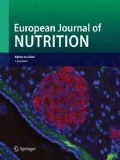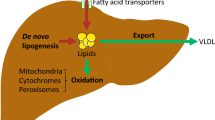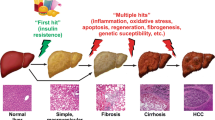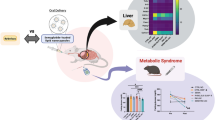Abstract
Background
Lycopene is a carotenoid whose biological activities and protective effect on prostate and breast cancer have been described, but little is known on its extra-intestinal metabolism and storage. While most alimentary lycopene is in all-trans configuration, in animal and human tissues approximately half of the lycopene is in cis isoforms.
Aim of study
Our object was to monitor the capacity of storage, isomerisation, and intracellular localization of all-trans and cis lycopene in hepatic stellate cells, which are the major sites of metabolism and storage of retinoids and carotenoids in the body.
Methods
We used the GRX cell line representative of murine hepatic stellate cells, incubated with 1–30 μM lycopene in culture medium. Analysis was done by high-performance liquid chromatography.
Results
Lycopene was able to induce expression of the lipocyte phenotype and it was internalized into GRX cells. Its cellular release only occurred in presence of albumin with a rapid initial decrease of intracellular lycopene. A corresponding increase in the culture medium was observed at 24 h. All-trans, 13-cis and 9-cis lycopene isoforms were identified in all the cell compartments. The membrane fraction contained the major part of lycopene, followed by the cytoplasmic fraction, lipid droplets and nuclei. The ratio between all-trans and cis isomers was approximately 2/1 in the majority parts of cell compartments.
Conclusions
This study identified a novel hepatic cell type able to store and isomerise lycopene. Liver can contribute to the serum and tissue equilibrium of cis/trans isomers of lycopene, and to participate in storage of lycopene under high extracellular concentration such as observed after the alimentary input.




Similar content being viewed by others
References
Blaner WS, Olson JA (1994) Retinol and retinoic acid metabolism. In: Sporn MB, Roberts AB, Goodman S (eds) The retinoids: biology, chemistry and medicine, 2nd edn. Raven Press, New York, pp 229–255
Boileau AC, Merchen NR, Wasson K, Atkinson CA, Erdman JW Jr (1999) Cis-lycopene is more bioavailable than trans lycopene in vitro and also in vivo in the lymph cannulated ferret. J Nutr 129:1176–1181
Boileau TWM, Boileau AC, Erdman JW Jr (2002) Bioavailability of all-trans and cis-isomers of lycopene. Biol Med 227:914–919
Boileau TWM, Clinton SK, Zaripheh S, Monaco MH, Donovan SM, Erdman JW Jr (2001) Testosterone and food restriction modulate hepatic lycopene isomer concentrations in male F344 rats. J Nutr 131:1746–1752
Boloukhère M, Baldo-Correa E, Borojevic R (1993) Experimental schistosomiasis mansoni: characterization of connective tissue cells in hepatic periovular granulomas. J Submicrosc Cytol Pathol 25:505–517
Borojevic R, Guaragna RM, Margis R, Dutra HS (1990) In vitro induction of the fat-storing phenotype in a liver connective tissue cell line-GRX. In Vitro Cell Dev Biol 26:361–368
Borojevic R, Monteiro ANA, Vinhas SA, Domont GB, Mourão PAS, Emonard H, Grimaldi-Junior G, Grimaud JA (1985) Establishment of a continuous cell line from fibrotic schistosomal granulomas in mice livers. In Vitro Cell Dev Biol 21:382–390
Chalabi N, Delort L, Le Corre L, Satih S, Bignon YJ, Bernard-Gallon DJ (2006) Gene signature of breast cancer cell lines treated with lycopene. Pharmacogenomics 7:663–672
Chalabi N, Le Corre L, Maurizis JC, Bignon YJ, Bernard-Gallon DJ (2004) The effect of lycopene on the proliferation of human breast cells and BRCA1 and BRCA2 gene expression. Eur J Cancer 40:1768–1775
Chalabi N, Satih S, Delort L, Bignon YJ, Bernard-Gallon DJ (2007) Expression profiling by whole genome microarray hybridization reveals differential gene expression in breast cancer cell lines after lycopene exposure. Biochim Biophys Acta 1796:124–130
Chang D, Ramalho LN, Ramalho FS, Martinelli AL, Zucoloto S (2006) Hepatic stellate cells in human schistosomiasis: a comparative immunohistochemical study with liver cirrhosis. Acta Trop 97:318–323
Clinton SK (1998) Lycopene: chemistry, biology, and implications for human health and disease. Nutr Rev 56:35–51
Eboumbou C, Steghens JP, Abdallahi OM, Mirghani A, Gallian P, van Kappel A, Qurashi A, Gharib B, De Reggi M (2005) Circulating markers of oxidative stress and liver fibrosis in Sudanese subjects at risk of schistosomiasis and hepatits. Acta Trop 94:99–106
Ferreira AL, Yeum KJ, Liu C, Smith D, Krinsky NI, Wang XD, Russell RM (2000) Tissue distribution of lycopene in ferrets and rats after lycopene supplementation. J Nutr 130:1256–1260
Fortuna VA, Martucci RB, Trugo L, Borojevic R (2003) Hepatic stellate cells uptake of retinol associated with retinol-binding protein or with bovine serum albumin. J Cell Biochem 90:792–805
Fortuna VA, Trugo L, Borojevic R (2001) Acyl-CoA:retinol acyltransferase (ARAT) and lecithin:retinol acyltransferase (LRAT) activation during the lipocyte phenotype induction in hepatic stellate cells. J Nutr Biochem 12:610–621
Gajic M, Zaripheh S, Sun F, Erdman JW Jr (2006) Apo-8′-lycopenal and apo-12′-lycopenal are metabolic products of lycopene in rat liver. J Nutr 136:1552–1557
Gann PH, Ma J, Giovannucci E, Willett W, Sacks FM, Hennekens CH, Stampfer MJ (1999) Lower prostate cancer risk in men with elevated plasma lycopene levels: results of a prospective analysis. Cancer Res 59:1225–1230
Grimaud JA, Borojevic R (1986) Portal fibrosis: intrahepatic portal vein pathology in chronic human schistosomiasis mansoni. J Submicrosc Cytol 18:783–793
Guimarães EL, Franceschi MF, Andrade CM, Guaragna RM, Borojevic R, Margis R, Bernard EA, Guma FC (2007) Hepatic stellate cell line modulates lipogenic transcription factors. Liver Int 27:1255–1264
Guma FCR, Mello TG, Mermelstein CS, Fortuna VA, Wofchuk ST, Gottfried C, Guaragna RM, Costa ML, Borojevic R (2001) Intermediate filaments modulation in an in vitro model of the hepatic stellate cell activation or conversion into the lipocyte phenotype. Biochem Cell Biol 79:409–417
Harrison EH, Blaner WS, Goodman DS, Ross AC (1987) Subcellular localization of retinoids, RBP and ARAT in rat liver. J Lipid Res 28:973–981
Herrmann J, Gressner AM, Weiskirchen R (2007) Immortal hepatic stellate cell lines: useful tools to study heaptic stellate cell biology and function? J Cell Mol Med 11:704–722
Huang CS, Shih MK, Chuang CH, Hu ML (2005) Lycopene inhibits cell migration and invasion and upregulates Nm23-H1 in a highly invasive hepatocarcinoma, SK-Hep-1 cells. J Nutr 135:2119–2123
Lehmann JM, Lenhard JM, Oliver BB, Ringold GM, Kliewer SA (1997) Peroxisome proliferator-activated receptors alpha and gamma are activated by indomethacin and other non-steroidal anti-inflammatory drugs. J Biol Chem 272:3406–3410
Lindshield BL, King JL, Wyss A, Goralczyk R, Lu CH, Ford NA, Erdman JW Jr (2008) Lycopene biodistribution is altered in 15,15′-carotenoid monooxygenase knockout mice. J Nutr 12:2367–2371
Liu C, Russell RM, Wang XD (2006) Lycopene supplementation prevents smoke-induced changes in p53, p53 phosphorylation, cell proliferation, and apoptosis in the gastric mucosa of ferrets. J Nutr 136:106–111
Margis R, Borojevic R (1989) Retinoid-mediated Induction of the fat-storing phenotype in a liver connective tissue cell line (GRX). Biochim Biophys Acta 1011:1–5
Martucci RB, Ziulkoski AL, Fortuna VA, Guaragna RM, Guma FC, Trugo LC, Borojevic R (2004) B-Carotene storage, conversion to retinoic acid, and induction of the lipocyte phenotype in hepatic stellate cells. J Cell Biochem 92:414–423
McClain M, Bausch J (2003) Summary of safety studies conducted with synthetic lycopene. Regul Toxicol Pharmacol 37:274–285
Moraru C, Lee TC (2005) Kinetic studies of lycopene isomerisation in a tributyrin model system at gastric pH. J Agric Food Chem 53:8997–9004
Nahum A, Zeller L, Danilenko M, Prall OW, Watts CK, Sutherland RL, Levy J, Sharoni Y (2006) Lycopene inhibition of IGF-induced cancer cell growth depends on the level of cyclin D1. Eur J Nutr 45:275–282
Nunes I, Mercadante AZ (2004) Production of lycopene crystals from tomato waste. Food Sci Technol 24:440–447
Russell RM (1998) Physiological and clinical significance of carotenoids. Int J Vitam Nutr Res 68:349–353
Sato M, Suzuki S, Senoo H (2003) Hepatic stellate cells: unique characteristics in cell biology and phenotype. Cell Struct Funct 28:105–112
Shahrzad S, Cadenas E, Sevanian A, Packer L (2002) Impact of water-dispersible beadlets as a vehicle for the delivery of carotenoids to cultured cells. Biofactors 16:83–91
Smith PK et al (1985) Measurement of protein using bicinchoninic acid. Anal Biochem 150(1):76–85
Stahl W, Schwarz W, Sundquist AR, Sies H (1992) Cis-trans isomers of lycopene and beta-carotene in human serum and tissues. Arch Biochem Biophys 294:173–177
Vertzoni MV, Reppas C, Archontaki HA (2005) Optimized determination of lycopene in canine plasma using reversed-phase high-performance liquid chromatography. J Chromatogr B 819:149–154
Vicente CP, Fortuna VA, Margis R, Trugo LC, Borojevic R (1998) Retinol uptake and metabolism, and cellular retinol binding protein in an in vitro model of hepatic stellate cells. Mol Cell Biochem 187:11–21
Wamer WG, Wei RR, Matusik JE, Kornhauser A, Dunkel VC (1993) β-Carotene uptake, metabolism and distribution in BALB/c 3T3 cells. Nutr Cancer 19:31–41
Yeum KJ, Booth SL, Sadowski JA, Liu C, Tang G, Krinsky NI, Russell RM (1996) Human plasma carotenoid response to the ingestion of controlled diets high in fruits and vegetables. Am J Clin Nutr 64:594–602
Zaripheh S, Boileau TWM, Lila MA, Erdman JW Jr (2003) [14C]-Lycopene and [14C]-labeled polar products are differentially distributed in tissues of F344 rats prefed Lycopene. J Nutr 133:4189–4195
Acknowledgments
We thank Adriana Mercadante and Itaciara Nunes for help in spectrum-UV analyses of lycopene isomer standards. This study was sponsored by CNPq grants of the Brazilian Ministry of Science and Technology and by FAPERJ grants of the Rio de Janeiro State Government.
Author information
Authors and Affiliations
Corresponding author
Rights and permissions
About this article
Cite this article
Teodoro, A.J., Perrone, D., Martucci, R.B. et al. Lycopene isomerisation and storage in an in vitro model of murine hepatic stellate cells. Eur J Nutr 48, 261–268 (2009). https://doi.org/10.1007/s00394-009-0001-6
Received:
Accepted:
Published:
Issue Date:
DOI: https://doi.org/10.1007/s00394-009-0001-6




